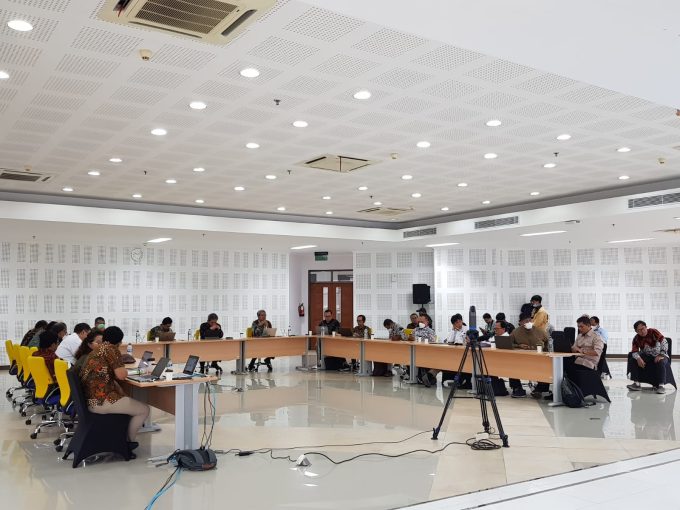
Yogyakarta, December 27th 2022—With the aim to implement Carbon Economic Value (NEK) in the peatland and mangrove sectors, Faculty of Social and Political Sciences Gadjah Mada University (FISIPOL UGM) held a hybrid Focus Group Discussion (FGD) on Tuesday (27/12) at Auditorium Mandiri Fisipol UGM. The FGD, which was held in collaboration with Badan Restorasi Gambut dan Mangrove, brings “Implementation of Carbon Economic Value (NEK) Policies in Implementing Peatland Restoration and Mangrove Rehabilitation” as the main topic.
The commitment to contribute in reducing carbon emission levels as a measurement to control the climate crisis is one of the main purposes of this discussion. Specifically, in this case, related to Carbon Economic Value policy in the peatland and mangrove sectors.
“Two wetland ecosystems, peat and mangroves, have an important role in climate change mitigation. The reason is that these two ecosystems have a high carbon storage capacity. Peat has a carbon storage capacity of 10 to 13 times more than other ecosystems. Meanwhile, mangroves, apart from having the ability to absorb greenhouse gases, can also store carbon that has been absorbed. It is also because mangrove areas can be 5 to 6 times wider than the size of terrestrial tropical forest ecosystems,” said Ir. Hartono, the Head of Badan Restorasi Gambut dan Mangrove.
However, peat and mangroves have experienced degradation, which in turn leads to challenges in restoration and rehabilitation. Prof. Dr. Ir. Satyawan Pudyatmoko, Deputy for Planning and Evaluation of Badan Restorasi Gambut dan Mangrove in his presentation, presents four challenges in peat restoration and mangrove rehabilitation. First, that the awareness, capacity and welfare of the people around mangroves and peat need to be increased. Second, management institutions at the site level need to be built and effectively operated. Third, the need for coordination, integration, synchronization, and synergy between sectors and society. And fourth, related to cooperation to fulfill resources for implementing peat restoration and mangrove rehabilitation.
“Based on the FOLU Net Sink 2030, Indonesia is committed to reducing greenhouse gas emissions in the land sector by 17.4% or reducing carbon emissions by 140 million tonnes of CO2 equivalent. To reduce emissions of that size until 2030, the costs needed could reach IDR 204 trillion. Most of these costs will be borne by businesses that have business permits for the forestry sector and land use. This is where the regulation of Carbon Economic Value (NEK) will play a role,” explained Ir. Lakshmi Dwanti, M.A. IPU, as the Director General of Climate Change Control at the Ministry of Environment and Forestry, in his presentation through the Zoom Meeting platform.
NEK arrangements in general include carbon trading through emissions trading and carbon offsets, carbon incentives through performance-based payments, and emission levies or taxes. Furthermore, Laksmi also explained that NEK is one of the instruments that can support target achievement. However, the most current-needed is how to design targets and design mitigation actions for peat and mangroves.
This includes how peatlands contribute to the NEK as conveyed by Prof. Ir. Trias Aditya Kurniawan, Lecturer in Geodetic Engineering, Faculty of Engineering, UGM in his presentation. Supporting this, Sigit Sunarta, Ph.D, Dean of the Faculty of Forestry UGM also explained the strategy and role of stakeholders in Indonesia’s FOLU Net Sink 2030. With the hope that Indonesia can achieve a Nationally Determined Contribution (NDC).
This FGD was attended by various interest groups ranging from the government, academia, community to industry players.
